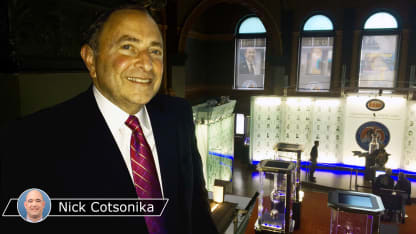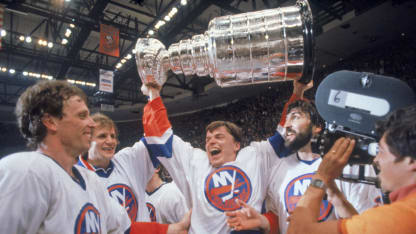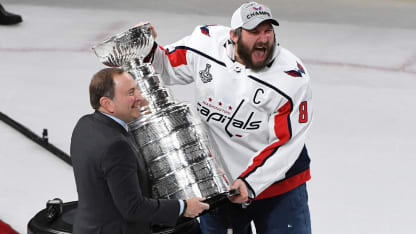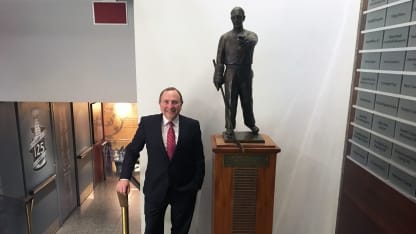The 2018 Hockey Hall of Fame induction is Monday. This class includes NHL Commissioner Gary Bettman, and Willie O'Ree, the first black player in the NHL, in the Builders category as well as former players Martin Brodeur, Martin St. Louis, Alexander Yakushev and Jayna Hefford. Here NHL.com columnist Nicholas J. Cotsonika profiles Commissioner Bettman.
Bettman, entering Hockey Hall of Fame, remains fan at heart
NHL Commissioner, who has long enjoyed being up close for others' moments in spotlight, receives his own

TORONTO -- Gary Bettman stands face to face with his immortality.
The NHL Commissioner is in the Great Hall on a quiet afternoon in October, looking at the empty plaque that will honor him after his Hockey Hall of Fame induction on Monday.
It hangs beneath Teemu Selanne's, above where Martin Brodeur's will be, at about his eye level. If he wanted, he could stare at his reflection, imagine how his image will look for all time and think of the inscription that will sum up his impact over a quarter of the League's 100-plus-year history.
Instead, he jokes about his stature.
"Actually," he says with a smile, "that's a good height for me."

The Great Hall is hockey's shrine. In hushed silence, under a stained-glass ceiling, the plaques light up for the honored members. The trophies shine in display cases. The Stanley Cup rests upon a pedestal for all to see and share.
"I've always found the Hall to be a sanctuary, to be what's good and right about the game, and I've always found the [induction] night here …" Commissioner Bettman said, his voice trailing off. "To say spiritual would be a little too extreme, but I've always felt that this was a place of reflection, a place of strength and stability for the game."
This is the Gary Bettman few know, self-deprecating, appreciative of his place in hockey. This is what it has meant to him on a personal level to be the first and only NHL Commissioner, presiding over the League's evolution since Feb. 1, 1993, and what it will mean to him to join this exclusive club as a Builder.
As a kid, he took the subway to Madison Square Garden, sat in the cheap seats and watched the New York Rangers. In college at Cornell, he had hockey season tickets for four years. One season, by luck of the draw, he sat in the fifth row behind the net.
"I got to see it up close and personal," he says.
As a young lawyer, he bought tickets and sat high at Nassau Coliseum on May 21, 1981, when the New York Islanders defeated the Minnesota North Stars 5-1 and clinched the second of four consecutive championships. He heard the fans count down, felt them roar, saw the Islanders mob each other and shake the North Stars' hands.
Then he saw the Stanley Cup. At the time, the NHL was the only major league to present its championship trophy in front of the fans.
"I sat there in disbelief as a sports fan, going, 'This is one of the coolest things I've ever seen,' " he said. " 'Here is the trophy, and here is everybody handing it off, and here are thousands of people all cheering.' It was the moment when I realized that the Stanley Cup had charisma."

© B Bennett/Getty Images
Little did he know he would present the Stanley Cup himself someday. He considers it an honor, first and foremost.
"This is a sport that more than any other honors its history and its tradition, and this trophy, going back to my first in-person witnessing of it, is the greatest trophy there is," he says. "This is the greatest tradition in sports."
But deep down, beneath his buttoned-up, business side, there is a fan who gets to come out of the stands.
"The thing that I really marvel at is, I have the best position that anybody can have to see the pure, raw emotion of the moment," he says, reaching out and clenching his fists. "To be that close to the celebration of what is the hardest championship to win, and to see it … It's not filtered by television. I'm not far away. I am right there watching it."
He emphasizes those last few words. Right. There. Watching it.
For 25 years, Commissioner Bettman has given speeches at the Hockey Hall of Fame induction ceremony. The dynamic is similar.
"These people were now going to be in some respects immortal, because here was their permanent place in the Great Hall," he says. "I always found that to be … overwhelming in the sense that it was … I had a sense of awe just watching their reactions to what was being recognized and how they seemed to feel in the moment."
Even walking around the Hockey Hall of Fame on an ordinary day, the dynamic is similar.
"Look at the faces of all the people," he says, "because in the final analysis, isn't it about the people?"
Now he will be presented with a ring on Friday. He will give a speech about his own induction and receive his own permanent place in the Great Hall on Monday. People will watch his reaction.
This is his moment. How will he feel?
"You know?" he says. "I don't know."
* * * * \
When Commissioner Bettman told his wife, Shelli, he was going into the Hockey Hall of Fame, she asked, "Does this mean they expect you to retire?"
"Not sure how she meant it," the 66-year-old says with a laugh. "But no. I'm energized, I'm excited and we've got a lot more to accomplish."
So why now?
NHL Deputy Commissioner Bill Daly, in a testimonial for NHL.com, writes that Commissioner Bettman is already "unquestionably the most influential executive in the history of the National Hockey League."
RELATED: [Bettman fit for Hall of Fame after tireless work to grow NHL, Daly says]*
Longtime NHL executive Brian Burke, a member of the Hockey Hall of Fame selection committee, says the question should be why Commissioner Bettman hasn't been inducted already.
"What Gary's done for the National Hockey League is seismic," says Burke, who worked for Commissioner Bettman as NHL executive vice president and director of hockey operations from 1994-98. "It's gone from a small business to a massive enterprise, and that's all under Gary Bettman."
The NHL has grown from 24 teams to 31 teams across North America, with an application pending for a 32nd in Seattle. Revenues have increased from $400 million to more than $4.5 billion per season. A new economic system has led to more stability and competitive balance. New rules have led to more skill and safety. The NHL has taken the game outdoors, overseas and online. And more.
"Most visionaries, they get to the top of the mountain, and they look at the next mountain range," Burke says. "Well, Gary's five ranges over."
As Commissioner Bettman stands on a balcony overlooking the Great Hall, Lanny McDonald, a member of the Hockey Hall of Fame and the chairman of its board, stops by for a hearty hug and handshake.
"To see where the League was [25 years ago] and see where it is now, he should be very, very satisfied," McDonald says.

© Ethan Miller/Getty Images
McDonald goes on to gush about the state of the game. Commissioner Bettman seems uncomfortable. He leans against the wall, looks down, folds his hands, shuffles his feet, walks over to the balcony and looks at the fans looking at the exhibits. He interjects one thing.
"Just for the record," Commissioner Bettman says, "I'm never satisfied."
Jeremy Jacobs, owner of the Boston Bruins and chairman of the NHL Board of Governors, says Commissioner Bettman has immersed himself in the game since Day One.
"You can't outwork him," says Jacobs, who was inducted into the Hockey Hall of Fame as a Builder last year. "I know of nobody that spends the amount of time that he spends every day moving this game forward in every way he can. He relishes that. He just loves to work. And this is the subject he loves the most.
"He's somebody that was so qualified to be in this Hall of Fame simply by the role he's played. Over the stretch of time, he's just moved this game [in a way] that has never been done before."
Some things he has done have not become public and never will.
"I can tell you I've never had no as an answer when it comes to helping players," says Glenn Healy, a former NHL goalie who was director of player affairs at the NHL Players' Association and is executive director of the NHL Alumni Association.
"So if you think he's all behind the owners and you think he's all about the profit, um, I'm here to tell you that is absolutely wrong. He has helped so many players without ever having his name recognized ever. The answer has never been no. I could tell you stories that would drop your jaw."
Commissioner Bettman's influence is already on display throughout the Hockey Hall of Fame in subtle ways, directly and indirectly.
He's somewhere in the background of a photo from June 18, 1993, when the Hall moved to its current home, and honored members were out front for a groundbreaking ceremony. His name is on the Lester Patrick Trophy, which he received in 2001 for outstanding service to hockey in the United States. His picture is in an NHL overseas exhibit.

"For our players, for the guys I represent today and when I played, he has made a huge difference for us, whether it has been driving salaries to a level that have helped us or whether it's better benefits or whether it is adding more jobs to our sport that help more families and more kids," Healy says. "You can't refute that. You can't refute it. It is real."
* * * * *
Three or four years ago, Commissioner Bettman brought his grandson Matthew to the Hockey Hall of Fame. They looked at the exhibits and played bubble hockey together. Matthew, now 12, plays AAA hockey.
"It was more about watching his reaction," Commissioner Bettman says. "He was intrigued by everything."
As he stands at the plaque at the Great Hall, Commissioner Bettman receives a phone call. It's his granddaughter Zoe, 10, Matthew's sister. He steps away to speak to her.
Over 25 years, time tends to blur. He says he marks time with family milestones. When he became NHL Commissioner, his youngest child, Brittany, was 4. She is 30 and had his youngest grandchild, Maddie, 10 months ago.
"He's always balanced an incredible work schedule with his family," Burke says. "He's got a great sense of humor. He's just a good guy. It pains me that people don't see that side of him.
"So what does this mean to Gary? I think he'd be very proud of it, but I also think that's not why he got into the business. He takes more pride in where the industry is, I think, than any personal accolade."
Commissioner Bettman says this is about everyone who has worked hard on and off the ice to bring the game where it is.
"If anything," he says, "I just view myself as a symbol of that."
This plaque, the symbol of the symbol, will hang for generations. Commissioner Bettman's children, grandchildren and great-grandchildren will be able to visit it. Imagine watching their reactions.
"That's the immortality part," he says. "That's what's overwhelming about this. It's the same feeling I get when I'm at a retirement ceremony and they raise a number to the rafters. Wow. That's going to be there forever."

















